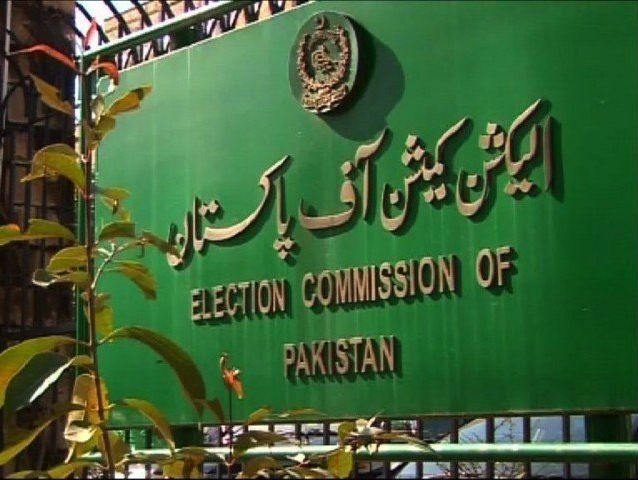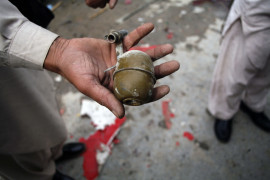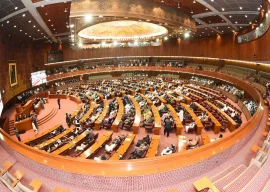
As the curtains rise on the first session of the National Assembly today, the Election Commission of Pakistan (ECP) found itself unable to dispel the cloud of uncertainty surrounding the allocation of reserved seats for the Sunni Ittehad Council (SIC), following a PTI-SIC 'merger' for this specific purpose.
The electoral body yet again appeared to drag its feet and let the controversy simmer after it reserved the verdict on the petitions filed by the SIC seeking the allocation of women and minority seats – leaving the matter up in the air as the maiden sitting of NA takes convenes today.
Moreover, the PTI has decided to escalate the matter to the Supreme Court if the reserved seats were given to other parties.
The SIC contends that since the ball was in the ECP's court, a decision could have nipped a brewing controversy over the NA’s fresh tenure in the bud by deciding whether the party deserved its share of the reserved seats.
Moreover, the controversy deepened when the ECP disclosed that SIC Chairman Hamid Raza had written a letter refusing to accept the reserved seats – a claim vehemently denied by Raza.
A five-member bench, chaired by Chief Election Commissioner Sikandar Sultan Raja, conducted the hearing on Wednesday.
The ECP considered applications pertaining to the reserved seats of the Sunni Ittehad Council, with the presence of PTI leader Barrister Gohar Ali Khan and SIC chief Hamid Raza before the commission.
During the hearing, CEC Sikandar Sultan Raja presented a letter from the SIC to the PTI counsel, stating that the party did not participate in the general elections and therefore did not desire the reserved seats.
However, Zafar expressed ignorance about the letter, stating that the SIC had not informed PTI about any such decision. In response, CEC Raja questioned the insistence on the allotment of reserved seats if the SIC had expressed a lack of interest.
PTI lawyer Ali Zafar objected that the ECP had decided yesterday to issue notices to all parliamentary parties.
The electoral body addressed the plea following President Alvi's refusal to sign a Ministry of Parliamentary Affairs summary requesting the convening of a National Assembly session.
President Alvi insisted that the allocation of the remaining reserved seats should precede the summoning of the NA session, as mandated within 21 days of the elections under the Constitution.
In the previous hearing, CEC Raja consolidated petitions from SIC, MQM-P, PPP, and PML-N. Advocates Farogh Naseem, Ali Zafar, Farooq H Naek, and Azam Nazeer Tarar represented MQM-P, SIC, PPP, and PML-N, respectively, before the five-member bench.
During the proceedings on Wednesday, Barrister Zafar argued that 86 independents, who won National Assembly seats, joined the SIC. "SIC is a political party with the right to form a government and contest elections," he asserted.
In response, a commission member pointed out that SIC did not participate in the February 8 polls.
Barrister Zafar emphasised that independents play a crucial role in presidential elections, citing constitutional provisions for reserved seat allocation.
CEC Raja assured that reserved seats would be allocated in accordance with the Constitution. Barrister Zafar contended that a party can include independent candidates and become a parliamentary party.
CEC Raja mentioned having a letter from SIC stating that the party neither contested nor sought reserved seats. Barrister Zafar claimed the PTI was unaware of the letter.
PPP's Naek argued that SIC failed to submit a priority list within the deadline. PML-N's Tarar asserted that reserved seats cannot be granted to independents under the law.
MQM-P's Naseem urged the ECP to allocate reserved seats to his party, emphasising SIC's non-parliamentary status. "The head of the SIC also contested the elections as an independent," he noted.
After the completion of the arguments, the ECP reserved the verdict.
Read: SIC’s reserved seat claim challenged
SIC refutes refusal of reserved seats
On the other hand, SIC Chairman Hamid Raza denied that the party refused to take reserved seats in a letter addressed to the ECP.
Addressing the media in Islamabad, Raza asserted that the letter sent to the ECP WAS being misconstrued.
In a media interaction after the hearing, Raza clarified that the ECP routinely sends letters to all parties after general elections, specifying a five per cent quota for women in the distribution of tickets. He emphasised that the letter in question was not exclusive to the SIC but addressed to all participating parties.
Raza stated that since his party did not participate in the elections, the SIC informed the ECP about its non-participation, and therefore, they had no list to allocate 5 per cent of tickets to women.
He clarified that the SIC did not express a refusal for reserved seats, and their letter did not mention any such rejection.
"We have a letter, and there is no mention of reserved seats in this letter," Raza maintained. "It should be read on the basis of Article 206 of the Constitution. My affidavit is also available, which says if we contest elections, we will take reserved seats."
Raza asserted that his letter had been distorted and misinterpreted and left the decision on the matter to the ECP's discretion. "It is the will of the CEC to interpret it whichever way he deems fit," he added.
PTI denounces 'stealing’ of reserved seats
Meanwhile, the PTI decried the “shameful” plan to “steal” seats reserved for women and minorities in the National Assembly.
In a statement on X, PTI accused the Election Commission of Pakistan (ECP) of distributing reserved seats among “mandate thieves” through “unconstitutional” plans.
Article 51 of the Constitution clearly lays out the basic principle of allocation of reserved seats, which are given to women and minorities in proportion to general seats, the party said.
“The Sunni Ittehad Council (SIC) is the parliamentary party with the largest number of seats in the Centre, Punjab and Khyber Pakhtunkhwa.
“The allocation of reserved seats to the [SIC] is part of an unconstitutional and undemocratic plan to illegally and forcibly convert the majority into a minority.”
PTI also vowed to take back the National and Punjab Assembly seats allocated through “fake Form 47s” and strongly resist the “unconstitutional” allocation of reserved seats."
Moreover, the PTI announced to escalate the matter to the SC if SIC reserved seats were distributed among other parties.
In a media talk, Barrister Ali Zafar said he hoped a decision would be taken as per the law and Constitution.
“But if our seats are distributed among the PML-N and PPP […] then we will definitely approach the Supreme Court but it would be such a huge violation that it will make the election of prime minister, president, Senate, NA speaker and deputy speaker will become controversial and will hold no legitimacy,” he added."














1708580923-0/image-(2)1708580923-0-270x192.webp)






COMMENTS
Comments are moderated and generally will be posted if they are on-topic and not abusive.
For more information, please see our Comments FAQ